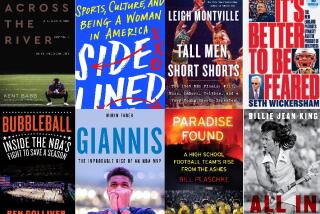The man who kept up with Lance
Some writers have all the luck.
British-born journalist John Wilcockson had nearly finished writing “Lance,” charting Lance Armstrong’s rise from Texas poverty to winning seven Tours de France before retiring in 2005. Then Wilcockson got a call from Armstrong last summer -- the cycling legend was trading in retirement for a shot at winning one more Tour, in no small part to silence rumors that his dominance of the sport had been aided by performance-enhancing drugs.
“There were a number of factors but I think that has been the biggest one,” Wilcockson said by phone the night before he was to fly from his home in Boulder, Colo., to Europe to cover his 40th Tour de France, where Armstrong would finish third on Sunday.
Ultimately, Armstrong’s return to the world of international cycling didn’t mean Wilcockson had to rewrite his book, just the ending. But as a writer, Wilcockson couldn’t have wished for better timing -- a dramatic comeback from a man with a history of comebacks, including beating testicular cancer in 1996.
“The point of the book is the making of the world’s greatest champion,” said Wilcockson, who has spent four decades writing about cycling. “I see it as a book which shows how he came to be the champion he is, all the people he met along the way.”
Wilcockson interviewed more than 50 people, including Armstrong’s mother and aunt; Chris Carmichael, his longtime coach; Armstrong’s ex-wife, Kristin Armstrong; and Massimo Testa, the Italian trainer and physician who helped Armstrong develop his now-dominant skills in sprints.
“There was a sort of destiny to his story,” Wilcockson said. “He would meet people just at the right time that would help him move along in his career, and in his life.”
So who was the most influential? Surprisingly, Wilcockson cites Adam Wilk, Chann McRae and John Boggan, childhood friends who, by the time Armstrong met them in fourth grade, were already involved in individual sports such as swimming, tennis and running, and rode bikes as part of their conditioning. Armstrong had been hanging around with the young football crowd -- a sport he didn’t play well. But his new buddies, and a chance encounter watching a televised Ironman competition, set him on the path to become a teenage triathlete champion, and as an adult, cycling’s greatest champion.
“Without that beginning in his athletic career, it may have gone another way,” Wilcockson said. “If he hadn’t had the athletic career, he probably would have gone to college and been more conventional.” And there would have been many fewer Americans who care about the Tour de France, or for that matter, cycling.
--
More to Read
Sign up for Essential California
The most important California stories and recommendations in your inbox every morning.
You may occasionally receive promotional content from the Los Angeles Times.










